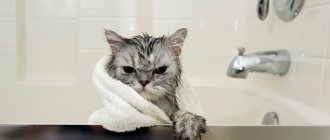Anyone has noticed that cats are incredibly brave and freedom-loving animals, which, when the vacuum cleaner is turned on, will run away from the room. Naturally, the question arises: why are cats afraid of the vacuum cleaner?
In fact, cats are afraid not only of the vacuum cleaner, but also of any unfamiliar object, especially one that makes such noise. Even if our smaller brothers remain in the room, they still experience a feeling of fear, and this is very dangerous for their health. Let's try to figure out why a cat and a vacuum cleaner are completely incompatible things, and how they can exist in the same space. Moreover, this technique is a necessity in a home where there is a cat, especially if it is long-haired.
Why are cats afraid of the vacuum cleaner?
Among all the household appliances that are found in almost every home today, it is the vacuum cleaner that causes panic in the cat. For example, most cats treat TV quite calmly, but they have very tender feelings towards heaters or are indifferent to them. According to experts, this is due to the fact that the vacuum cleaner is the source of the largest and loudest noise among other equipment in the house, and therefore it is the main contender for the role of causative agent of cat dormancy.
Someone may disagree with this statement: after all, a tape recorder or TV breaks the silence much more often than a vacuum cleaner. But the thing is that it is for this reason that cats perceive them calmly. In addition, the sounds that a TV or radio makes are familiar to the cat: these are the voices of people to which it is accustomed, the sounds that it hears from the window (the noise of passing cars, for example). The noise of a working vacuum cleaner is unfamiliar and incomprehensible to her, and therefore especially scary.
The operation of a vacuum cleaner is almost never completely silent, and even the latest models, despite the significantly reduced noise level, are still not completely silent. Our pets' hearing is more sensitive than their owners', so a sharp sound of unknown origin causes anxiety in animals.
At the same time, many owners believe that the noise and appearance of the device are not the main reasons. Why are cats afraid of a vacuum cleaner if it is not related to noise: after all, they often do not react at all to a working drill, but it makes no less sharp sounds?
Other cat fears
In order not to traumatize your pet’s psyche, remember what else they are afraid of.
What are cats afraid of?
- Cats are very afraid of objects that make too much noise. Hair dryers, blenders and other similar devices should be kept away from your pet.
- If a cat grows up in an apartment and never goes outside, it will be afraid of strangers. Therefore, at least occasionally introduce your pet to nature and the surrounding world.
- Pets are very afraid of the cold, so in winter, try to prevent the cat from freezing.
- Almost all cats, with the exception of a few breeds, are very afraid of water.
If you are raising a pet, then do not forget to give it affection, love and care. Always protect and protect your pet from danger, even in the form of a vacuum cleaner.
Dust
To understand why cats are afraid of vacuum cleaners, we advise you to pay attention to older models of these devices. While working, they not only clean carpets, furniture, etc., but also raise tiny particles of dust into the air, which interfere with the animal’s breathing. Many have observed how their pet begins to sneeze while cleaning (unless, of course, he hid).
More modern models, fortunately, no longer have this drawback, but the peculiar smell that is felt during their operation still bothers cats.
Owner's poor judgment
Usually, the acquaintance with a household appliance occurs at a moment when the cat is completely unprepared for it and feels especially defenseless - during sleep. Many owners do not hesitate to turn on the vacuum cleaner when it is convenient for them. A buzzing monster that suddenly appears out of the ground makes an indelible impression on the pet, once and for all instilling unconscious terror. Particularly stupid owners also have fun seeing the animal’s panic reaction and deliberately frightening it even more. It is not surprising that in this way the first impression of terrible danger only becomes stronger.
Visual perception
How to explain why an animal hides while cleaning? Why are cats afraid of the vacuum cleaner? Cat psychology is structured in such a way that in the animal’s mind such a large and incomprehensible object, which also moves around the apartment, is associated with an enemy who can attack at any moment and certainly cause harm.
When a roaring object with a long wire and hose, strange tubes and brushes begins to move around the apartment, the animal panics. His only desire at this moment is to hide as far as possible and not leave his shelter until the mechanical enemy leaves.
Acoustic impressions
A cat's delicate hearing easily picks up even the rustling of a mouse behind the wall. What can we say about the effect that the terrible roar of the engine has on the sensitive membranes. Sometimes it can even cause physical pain to the animal. In addition, the purr does not understand the purpose of the sounds it makes. What is this: a warning, a threat or a signal to attack? Additional irritation lies in the inability to hear other surrounding sounds that may signal the approach of real danger. Or you might miss an invitation to dinner, which is even worse!
Vibrations
Experts name another reason that explains why cats are afraid of the vacuum cleaner. Sometimes our pets are afraid not of the appearance of the device or the noise it makes. Cats are able to detect the slightest vibrations on the surface of the earth: remember the well-known facts when cats are the first to show concern even before a person feels the first weak tremors of an earthquake. They pick up the weakest vibrations, while experiencing the strongest excitement, anticipating danger. It is in order to protect itself from it that the cat hides in a safe place.
Causes of cats' fear of vacuum cleaners
It is believed that cats are afraid of the vacuum cleaner for the following reasons:
- The noise level is too high.
Old domestic vacuum cleaners, which still serve faithfully in some homes, generate noise in the range of 75-85 dB - this is very loud. Modern imported vacuum cleaners operate much quieter - their noise varies between 40-45 dB, which is comparable to soft human speech. But for cats, whose hearing is 3 times sharper than humans, the noise of even the most modern vacuum cleaner can be compared to, say, the roar of a jackhammer. Naturally, the animals try to quickly escape from the room where an incomprehensible “monster” begins to hum;
Fear of an unknown object.
Cats are not able to understand why the owner periodically takes out a humming machine with a wire. The situation is no better if there is a robotic vacuum cleaner in action, which even moves on its own. To understand the horror of a cat, a person just needs to imagine that a flying saucer suddenly appeared on the street in broad daylight. An animal will not be able to determine whether a vacuum cleaner is dangerous or not (just as it will be impossible for a person to understand whether a UFO is dangerous);
Fear of vibration coming from the vacuum cleaner.
It has been scientifically proven that cats anticipate man-made disasters - earthquakes and tsunamis. Animals sense the approach of disaster with the help of vibrissae and sensitive receptors on the pads of their fingers, when there is even the slightest oscillatory movements of surrounding objects. It may seem funny, but a running vacuum cleaner produces enough vibration that the cat's brain perceives it as a signal of danger;
Sometimes cats are afraid of a vacuum cleaner due to the fault of the owner. Persistent intolerance to the vacuum cleaner occurs, for example, after the owners turn on the device once or twice while the pet is sleeping. A sudden loud noise causes the animal to rush away to find a safe shelter. A cat simply cannot determine with lightning speed whether a loud noise is dangerous. There are also situations when some “jokers” try to suck the tail or paw of an animal into the pipe of a humming machine. And some people use a vacuum cleaner to try to rid animals of dead hair and skin particles, although this, of course, should not be done. Need I say that after this, any pet will be horrified at the mere sight of the hated vacuum cleaner?
Encroachment on territory
Most felines perceive this device as a living creature: it moves around the apartment next to its owner and makes some sounds. It is this perception that also explains why cats are afraid of the vacuum cleaner. It is quite obvious to the animal that an enemy has appeared in the house, laying claim to its territory, shamelessly exploring all its corners.
With this perception, the behavior of the animal may be different: some cats will prefer to hide, taking into account the size of the enemy, others will prefer to die on the battlefield, but attack the “occupier”.
Signs of vacuuming anxiety in cats
In this article we are going to figure out why cats are afraid of the vacuum cleaner. To begin with, let us clarify that this piece of household appliance causes horror not in all pets, but in most representatives of the cat family. Typically, signs of fear of a working vacuum cleaner are as follows:
Dilated pupils of the eyes;
Escape from the room where the machine is working;
Attempts to hide under the bed, in the closet;
Escape from an apartment through a window (window) or an open door;
Hissing, loud meowing;
- Bites and scratches from the owner (if he tries to pick up a frightened cat).
Why are cats afraid of the vacuum cleaner? How to make them friends?
There is not and cannot be a definite answer to this question, since it all depends on the character of your pet. However, every animal owner must make an attempt to end this hostility. We offer you some advice from veterinarians and experienced cat owners. Perhaps among them you will find one suitable for your situation.
If possible, replace the old model of vacuum cleaner with a more modern one. The new device will make less noise and will not raise dust into the air, which your pet will certainly appreciate.
Don't start vacuuming when your pet is sleeping. This does not mean that cleaning should be postponed until the cat has slept. Before turning on the device, call your pet: a sleeping animal may become even more stressed.
If you have the opportunity, send your cat to another room while cleaning. At the same time, do not close the doors: let the cat decide for itself whether it should leave the shelter, or whether it is better to postpone meeting the unexpected guest until a later time.
Leave the vacuum cleaner unplugged in the room for a while so that the cat can approach it, inspect it, and sniff it. If your pet has ceased to feel afraid of the turned off vacuum cleaner and approaches it without fear of provocation, praise it and pet it.
Breeders recommend giving your cat his favorite treat in close proximity to the vacuum cleaner. In this case, when the animal sees the device, pleasant associations may arise: for example, thoughts about a treat. This must first be done with the vacuum cleaner turned off, and then you can try to turn it on.
How to help your pet stop being afraid
It is enough to put in a little effort, ingenuity and patience to teach your pet not to be afraid of the vacuum cleaner:
- Most cats will hide in a secluded place at the sound of a vacuum cleaner being pulled out. The animal should be given the opportunity to familiarize itself with an unknown object. To get to know each other better, it is recommended to leave the electrical appliance in a visible place as often as possible. At first, the cat will not even enter the room where the vacuum cleaner is located. But gradually interest will prevail, and the animal will begin to approach the device and sniff it. For some cats, this measure is enough to stop them being afraid of household appliances.
- It is important to talk to your pet. Before you start cleaning, you should play with your cat to help it relax. Before you take out the vacuum cleaner, you need to tell your pet that there will be a noisy unit cleaning now, but you shouldn’t be afraid of it, especially when the owner is nearby. Cats perceive human words at the subconscious level, and such a measure can give a positive result. If the cat decides to stay in the room where there is an electrical appliance, it should first be turned on at minimum power, allowing the animal to get used to the sound.
- If the cat categorically refuses to approach the switched off vacuum cleaner and get acquainted with it, you can resort to another trick: place the household appliance near the bowl of food. The cat will be forced to come close to the device and will gradually get used to it. This measure may seem harsh, but if no other methods of teaching a vacuum cleaner produce results, this is the only thing left to do.
- Once you have managed to ensure that the cat does not immediately run away when the vacuum cleaner turns on, it is recommended to turn it on once a day for at least a few minutes. The loud sound should become commonplace for the animal, and over time it will cease to be afraid of it.
These recommendations do not always produce results.
If a pet, as a kitten, experienced severe stress from an encounter with a vacuum cleaner, the likelihood that it will eventually cease to be afraid of it is extremely small.
In such cases, the owner will have to retreat and come to terms with this state of affairs.
Terror of the unknown
All living beings, as well as people, can calmly perceive the existence of those things that are as simple and understandable as possible.
This concerns the properties and characteristics of the object. But all incomprehensible phenomena are always perceived with caution by the creature. Even people are afraid of new events and phenomena. What can we say about animals? The vacuum cleaner has an incomprehensible and surprising shape, and most likely, according to the cat, it makes creepy sounds. It is clear that the cat will react to it the same way a person would react to a landing flying saucer. The cat cannot assess why a vacuum cleaner is needed and whether it is fraught with danger. Here, all the cat’s instincts will seem to signal impending danger. The cat will run away from her.
Any living creature, including people, calmly perceives the proximity of understandable things, the properties and capabilities of which have long been known. However, unknown phenomena and objects are always perceived with caution. Even people are often wary of complex mechanisms and incomprehensible events. What can we say about our smaller brothers?
A cat reacts to an obscure object of an incomprehensible shape that makes eerie sounds in much the same way as a person would react to a “flying saucer” with aliens landing in his yard. It is unknown why it is needed and what threat it poses. In such a situation, all the instincts of the animal signal one thing: there is a mysterious danger ahead, from which you must flee!
There are objective reasons why animals are so afraid of a vacuum cleaner:
- The appliance is too loud. The fact is that a cat’s hearing is heightened. It is three times higher than that of humans. Therefore, the sounds that this scary machine makes are completely unacceptable for your four-legged friend. They frighten him with their volume. Imagine if you heard a vacuum cleaner making noise three times louder than it does now. You wouldn't like it either.
- The vacuum cleaner scares the pet with its very appearance. The car itself is just the size of a cat. She is even slightly larger than your pet. He is frightened by the dimensions and appearance of this device. The cat perceives this device as a real monster or monster. In addition, the animal does not understand why it is needed at all, and why the owner periodically uses it. The pet's reaction is comparable to the reaction of a person who happened to meet an alien. It's scary because you don't know what to expect from this unknown creature.
- The danger comes from the vibrations that come from the vacuum cleaner. A cat can sense an earthquake or other impending disaster. They have sensitive areas of the body for this - whiskers and special receptors on the pads of their paws. Thanks to them, they sense even minor fluctuations in the environment. The pet picks up vibrations from a running machine and perceives this as a signal of a threat.
- The fear arose through the fault of the owner. A person could turn on the vacuum cleaner when the pet was sleeping. The roar suddenly woke up the animal; from surprise and fear, it might not have had time to run away and hide. Careless handling of the pet is also possible. The owner might try to vacuum the cat as a joke. Under no circumstances should this be done. Such severe stress causes harm to the body. Also, you should never suddenly scare an animal on purpose.
To help your cat overcome his fear of a vacuum cleaner, at least a little, buy a new, modern device that will be quiet. Try to let the cat out of the room in advance so as not to unnecessarily irritate his weak psyche. Or you can introduce your red pet to the vacuum cleaner. Of course, this should be done when the device is not working. You should only start cleaning the room when your cat is awake and not asleep.
You can please your ginger cat or ginger cat with a toy to distract him from the vacuum cleaner. You can buy pet supplies in the supermarket here, follow this link and you will find a good assortment of toys and cat food for yourself. It's good to have a choice.
Interestingly, some cats ride on a robot vacuum cleaner with great pleasure; there are funny videos on the Internet with robot vacuum cleaners and cats.
With a personalized approach and strong love for your pet, you can help him conquer his fears.
It happens that wonderful hunters with sharp claws and teeth are afraid of completely harmless things. Well, for example, a vacuum cleaner! What is so terrible about this device that it makes a brave and sensible cat with eyes huge in horror take off without feeling the ground under its feet?
A cat, just like a person, treats an object quite calmly, without unnecessary hysterics, if it understands why it is needed and how it works, and most importantly, how it can influence it.
For example, when a cat sees a large bag of food for the first time, she fearfully begins to sniff it, touch it with her paw and think: well, something big, at least it won’t attack. A cat and a vacuum cleaner are like you and a flying saucer that landed outside your window. God, what is this, how, what does he need, why here. This is panic, horror, a nightmare from misunderstanding, ignorance of the purpose of the object that he can throw away. In such situations, all the cats’ senses scream: run, get away, the further the better!
Let's imagine how a cat sees a vacuum cleaner: an oddly shaped thing moving unpredictably around the room. From the point of view of cats, the movement of an object (a vacuum cleaner) defies logic: who knows, maybe he will now attack me and hit me with his huge paw - the hose? Or, like a snake, it will coil around my neck and begin to choke me.
A cat's hearing is incomparably better and more sensitive than ours. Any intrusive buzzing is very annoying for the cat and can even lead to a headache. The noise of a vacuum cleaner is the main cause of fear. Firstly, it is loud and harsh. Secondly, she doesn’t understand what he means: will he attack now, drive him away, or just warn? What does this sound mean? What if a dangerous enemy is sneaking up now, and I can’t hear him because of this buzzing thing?!
The organs of touch are the paw pads and antennae. At the slightest vibration of the surface, they tell the cat that danger is nearby: a car or a train approaching in the distance. Therefore, it is not surprising that the cat is afraid of the vacuum cleaner, because in addition to noise, it creates vibrations, which the kitty perceives as a signal to escape.
There are, of course, exceptions, for example, in the case of a robot vacuum cleaner. With such a wonderful technique, cats can become best friends, this vacuum cleaner is not so noisy, it does not create such vibrations, so the cat is more curious than scared. The cat can even climb onto the vacuum cleaner and take a ride, a kind of free attraction.











